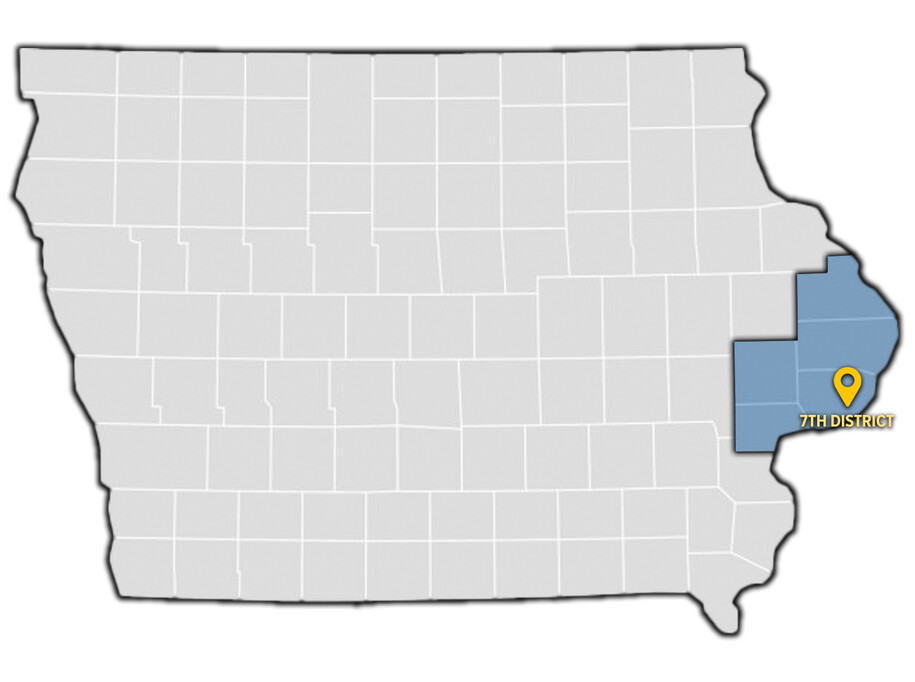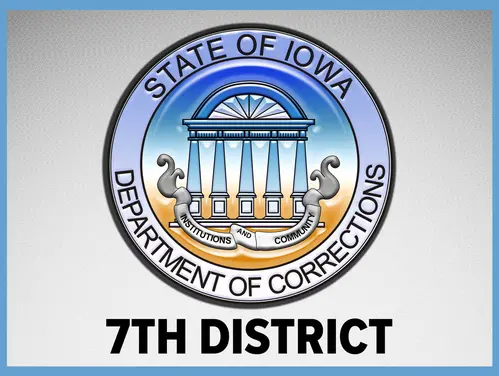
List items for Accordion - 7th District - Quick Facts

| Name |
|---|
| 7th District |
| Address |
|---|
605 Main St. Davenport, IA 52803 |
| District Director |
|---|
| Rob Metzger |
| Phone Number |
|---|
| (563) 322-7986 |
| 5 Counties |
|---|
· Cedar · Clinton · Jackson · Muscatine · Scott |
| Services Offered |
|---|
· Anger Management · Client Employment · Drug Treatment Court · Federal Clients · Mental Health Services · Operating While Intoxicated (OWI) Treatment · Parole Supervision · Pre-Sentence Investigations · Pre-Trial Interviews/Supervision · Probation Supervision · Residential Placement · Sex Offender Treatment · Transitional Skills · Victim Impact Programming |
List items for Accordion - 7th District - About

| 7th District Advisory Board |
|---|
| View the Advisory Board |
| The 7th District Advisory Board is established by Iowa Code Section 905.3. |
| 605 Center (Work Release Center) | |
|---|---|
| Address | 605 Main St. Davenport, IA 52803 |
| Phone | (563) 322-7986 |
| Residential Correctional Facility | |
|---|---|
| Address | 1330 W 3rd St. Davenport, IA 52802 |
| Phone | (563) 324-2131 |
The 7th District High Risk Unit (HRU) is a special public safety unit established within the Department. All of this unit's officers and the Supervisor will be Certified Law Enforcement Officers. They are the only Department staff certified and allowed to carry weapons. This unit performs a large number of vital functions for the District and the community including:
- Support department programs (i.e., field and residential units, GVI, Specialty Courts)
- Conduct checks in all five counties of the district
- Ensure clients are complying with the conditions of supervision
- Detect violations and identify or introduce interventions before new victims are created
- Execute warrants and apprehend absconders
- Partner with and collaborate with local law enforcement including the U.S. Marshal Task Force by information sharing, special projects, etc.
| Learn More |
|---|
| 7th District HRU |
| Cedar County Field Services Office | |
|---|---|
| Address | Cedar County Courthouse 400 Cedar St. Tipton, IA 52772 |
| Phone | (563) 886-3449 |
| Clinton County Field Service Office | |
|---|---|
| Address | 121 6th Ave. S Suite 101 Clinton, IA 52732 |
| Phone | (563) 243-7943 |
| Jackson County Field Services Office | |
|---|---|
| Address | Jackson County Courthouse 201 W Platt St. Maquoketa, IA 50260 |
| Phone | (563) 652-2751 |
| Muscatine County Field Services Office | |
|---|---|
| Address | 101 W Mississippi Dr. Suite 200 Muscatine, IA 52761 |
| Phone | (563) 263-9168 |
| Scott County Field Services / Pretrial Release Unit Office | |
|---|---|
| Address | 605 Main St. Davenport, IA 52803 |
| Phone | (563) 322-7986 |
| Pay Fees - Using Gov2Go |
|---|
| Pay Here |
| Credit Cards Accepted |
|---|
· American Express · Discover · MasterCard · Visa |
*Note: A per transaction service fee of 2.5% and $1.50 will be charged by the payment processing company for this service.
| Annual Reports |
|---|
| FY2024 Annual Report |
| Residential Client Resources |
|---|
| Client Grievance Form |
| Client Grievance with PREA Information |
| Residential Correctional Facility (RCF) Fact Sheet |
| 7th District |
|---|
| Staff Directory |
List items for Accordion - 7th District - Client Treatment Programs

This tool connects the offender with the offended community through significant work to benefit the community, and has been used extensively by the courts.
Drug Court is a special court with the responsibility of handling cases involving offenders with drug-related convictions and those offenders that have criminal histories tied to drug addiction. Drug court has the capability of comprehensive supervision, drug testing, treatment services and immediate sanctions and incentives. It is a diversion program designed to divert non-violent substance abusing offenders from the criminal justice system (Prison). Drug court officers utilize numerous community partners to assist the offenders dealing with recovery and rehabilitation issues.
Drug Court is an eighteen month, four-phase program involving an intensive treatment continuum with weekly interaction with each participant. Participants initially attend weekly court hearings where their progress is reviewed by the Court.
The Drug Court is a post adjudication model. Following a plea by the offender, the offender is “sentenced” to Drug Court to comply fully with the program. Failure to do so may result in the offender serving the initial sentence.
Electronic Monitoring is an adjunct to other community based correctional supervision and treatment requirements. It is primarily utilized for high risk offenders (sex offenders) and those required by law or by the court as a condition of supervision. The department is utilizing the latest innovations in electronic surveillance to more effectively monitor high risk offenders. The department currently uses active monitoring units, mostly utilized by offenders in SOTP. Through the use of these units, the safety of the community can be greatly enhanced and the accountability of the offender is maintained.
Global Positioning Satellite (GPS) is the most innovative electronic surveillance technology used by criminal justice agencies. The system combines GPS technology and advanced wireless communication protocols, flexible reporting and unique mapping capabilities to effectively track offenders twenty-four (24) hours a day, seven (7) days a week. The Central Command Center (CCC), located in Des Moines, Iowa, is the main information area.
The goal of electronic monitoring is to minimize the risk to the community through monitoring an offender’s movements 24 hours a day.
Interstate Compact is the supervision of offenders transferred to Iowa from another state. Iowa, likewise, transfers offenders to other states for supervision. Offenders supervised are usually on probation or parole and are handled similar to Iowa offenders under probation supervision.
This program provides a group education process for men and women who practice a pattern of abusive behavior. As required by Iowa law, the department provides batterers education groups for persons convicted of domestic abuse. After an extensive orientation session, batterers’ are placed in groups which meet weekly; men meet for twenty-four (24) weeks, women (16) weeks.
The Scott County Mental Health Court (SCMHC) is an example of a specialty or problem-solving court that provides an alternative to incarceration for clients with chronic mental health needs; these clients must meet established criteria. SCMHC, through intensive individualized services, will help its clients, who meet these criteria, treat their illness, take their medication as prescribed, satisfy their basic food and shelter needs, and avoid expensive incarceration or hospitalization. The goal of the SCMHC is to impose a sentence that provides the maximum opportunity for the rehabilitation of the client, while protecting of the community and considering the victim’s rights and safety. SCMHC is a four-phase program that lasts a minimum of one year for misdemeanants and a minimum of two years for felony cases. Clients start the program by having weekly contact with the SCMHC team members (probation officers and other support staff) as well as weekly court appearances. As clients’ progress through the program, their reporting requirements are reduced. SCMHC operates as both a post-plea/pre-adjudication and post-adjudication model. At the very least clients are ineligible for SCMHC unless they have entered a guilty plea in their case. The court may dismiss their cases upon successful completion of the program, while other participants who entered the program post adjudication would receive a discharge from their suspended jail or prison terms.
Moral Reconation Therapy - MRT is a systematic, cognitive-behavioral, step-by-step treatment strategy designed to enhance self-image, promote growth of a positive, productive identity, and facilitate the development of higher stages of moral reasoning. All of these goals are ultimately demonstrated by more appropriate behavior on the part of the program participants. MRT uses completion of 16 steps on a freedom ladder through group participation and homework assignments. Groups are facilitated by DOC employees and progression through the steps is determined by participants' investment in the program, participation, completion of assigned work with the fellow group members voting on whether the participant is ready to advance to the next step on the Freedom Ladder.
The Department has (2) Offender Employment Specialists (OES). The OES’ primary function is to assist offenders with securing and maintaining employment, primary focus is with residential offenders. The OES establishes relationships with local employers in an effort to build a partnership to employ offenders housed in the residential facilities. The OES also offers assistance to offenders under field supervision but are not being housed in either of the residential facilities. The OES works directly with offenders to monitor their efforts in obtaining employment, maintaining employment and working with offenders on resume and application writing.
The OWI Program is provided for offenders convicted of a second or subsequent Operating While Intoxicated charge, as authorized by the Iowa Code, Chapter 904.153. Offenders in these programs are considered state inmate status but are able to serve their sentences and participate in treatment in community corrections’ residential facilities in lieu of prison. These offenders are under the jurisdiction of the Iowa Department of Corrections, and, unless they discharge their sentences while in the facility, must be released by the Iowa Board of Parole.
OWI programming is provided to offenders at the residential facilities. Substance abuse treatment services are provided through contracted services with the Center for Alcohol & Drug Services.
The Sex Offender Treatment Program was specifically designed to help reduce sexual abuse victimization by providing treatment to those offenders who commit sex crimes. To address the increasing number of sex offenders assigned to supervision, the department has developed a comprehensive supervision and treatment program that utilizes specially trained staff (GPS Officers) to monitor high risk sex offenders assigned to GPS monitoring to ensure public safety. The SOTP program involves assessment, evaluation, professional counseling, perpetrator treatment groups (active and maintenance) and intensive supervision of sex offenders, either within the residential facilities or under intensive supervision.
The goal of treatment is to reduce the risk of re-offending and make self-management possible. The outcome of treatment lies with the offender. By admitting their crime fully, acknowledging and accepting responsibility for their behaviors, feeling remorse and developing empathy with their victim, new skills can be learned so that there will be no new victims. Sex offender treatment appears to be a major factor in reducing future criminal behavior.
Tech2Connect (T2C) is a collaboration the 7th District has with 7 Iowa prisons providing reentry services as soon as clients arrive in prison through programming and communication via tablets. Community Corrections Program Coordinators complete Comprehensive Treatment Assessments with incarcerated individuals and develop action plans based on the assessment results. This provides an opportunity for engaging conversations and connections to suitable resources. T2C enables individuals to begin working on needs/goals and having appointments at the pre-release stage via virtual meetings with POs and other community partners. The rapport building begins immediately and incarcerated individuals have plenty of need focused materials and interactions with community resources so they are not just doing their time but utilizing their time productively and centered on release and reentry goals. They are offered mental health evaluations, substance abuse interventions, skill building, motivational messaging, virtual group participation, community mentorships, employment and housing resources, all while in prison with continuity of these SERVICES AND RELATIONSHIPS in the community.
List items for Accordion - 7th District - Community Resources

| State of Iowa Contacts |
|---|
| Attorney General |
| Board of Parole |
| Courts Online Search |
| Crime Victim Assistance |
| Governor’s Office |
| Iowa VINE |
| Office of Ombudsman |
| Sex Offender Registry |
| State of Iowa |
